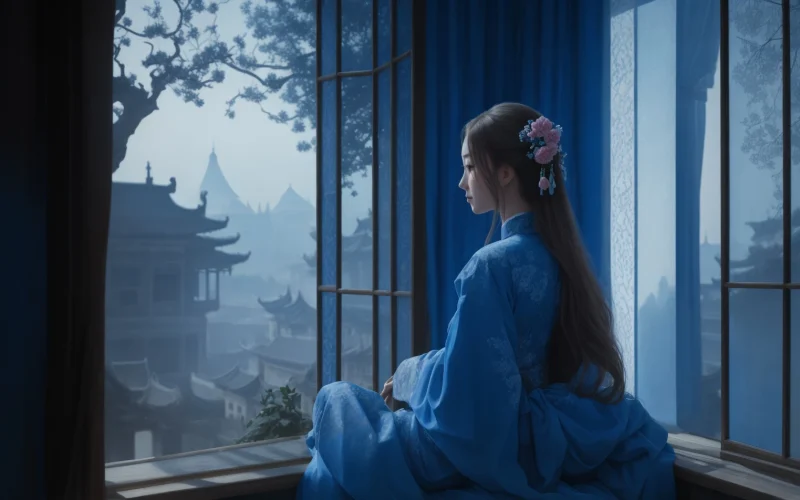A lady of the palace these twenty years, She has lived here a thousand miles from her home - Yet ask her for this song and, with the first few words of it, See how she tries to hold back her tears.
Original Poem
「何满子」
故国三千里,深宫二十年。
一声何满子,双泪落君前。
Interpretation
This poem by Tang Dynasty poet Zhang Hu is a classic example of palace lament poetry, depicting a palace maid confined in the depths of the imperial quarters who pours out her melancholy through a song. "He Manzi" was originally the name of a musical composition that later became a poetic title. Zhang Hu uses this musical reference, infusing it with stark imagery and intense emotion, to reveal in just four lines the tragic fate of the palace maid—her isolation, homesickness, and pitiable existence.
First Couplet: « 故国三千里,深宫二十年。 »
Gù guó sān qiān lǐ, shēn gōng èr shí nián.
Three thousand miles from my homeland, Twenty years deep within palace walls.
This couplet intertwines spatial and temporal dimensions to encapsulate the maid’s tragic life. The distance of "three thousand miles" symbolizes complete separation from family and homeland, while "twenty years" conveys the endless torment of prolonged seclusion. Through these two stark numbers, the poet thrusts the reader into the maid’s psychological and existential despair.
Second Couplet: « 一声何满子,双泪落君前。 »
Yī shēng Hé Mǎnzǐ, shuāng lèi luò jūn qián.
At the sound of "He Manzi," Twin tears fall before my lord.
Here, the poem shifts to a moment of emotional eruption, using the song as a trigger for long-suppressed sorrow. The contrast between "one sound" and "twin tears" underscores how deeply the music pierces her heart—a single note unleashing decades of unspoken grief. The restraint of her weeping before the emperor makes the moment all the more poignant.
Holistic Appreciation
In just four lines, Zhang Hu conveys overwhelming emotion and psychological depth. The first couplet establishes the maid’s fate—her youth lost to the palace’s oppressive confines—while the second builds to a climax where music, memory, and reality collide. The transformation of "lament" into "beauty" is masterful: through understated elegance, the poem captures a life of silent suffering with heartbreaking authenticity.
Artistic Merits
The poem exemplifies the power of minimalism, blending scene and emotion with profound economy. Zhang Hu employs numerical parallelism ("three thousand miles" / "twenty years") to make abstract suffering tangible, while the juxtaposition of "one sound" and "twin tears" crystallizes a single, devastating moment. The artful use of omission—never describing the maid’s face or her full story—invites the reader to imagine her sorrow, amplifying the poem’s emotional force.
Insights
This poem exposes the hidden tragedies of women behind the palace’s opulent facade. Through the maid’s voice, Zhang Hu critiques the feudal system’s erasure of female autonomy, prompting reflection on freedom, kinship, and the meaning of existence. Her tears—shed silently before power—resonate as a timeless plea for dignity.
Poem translator
Kiang Kanghu
Zhang Hu (张祜, 785-849 A.D.) was a poet from Qinghe in the Tang Dynasty, he wrote more than a thousand poems in total. In his early years, he lived in Gusu, but in the middle of Changqing, he was not recommended by Linghu Chu. He was rejected by Yuan Zhen, so he went to Huainan and lived in seclusion in Danyang Qu'a. During his life, Zhang Hu made remarkable achievements in poetry. Zhang Hu was named after his poem "Three thousand miles from his homeland, twenty years in the deep palace", and his 349 poems are included in The Complete Tang Poems.












